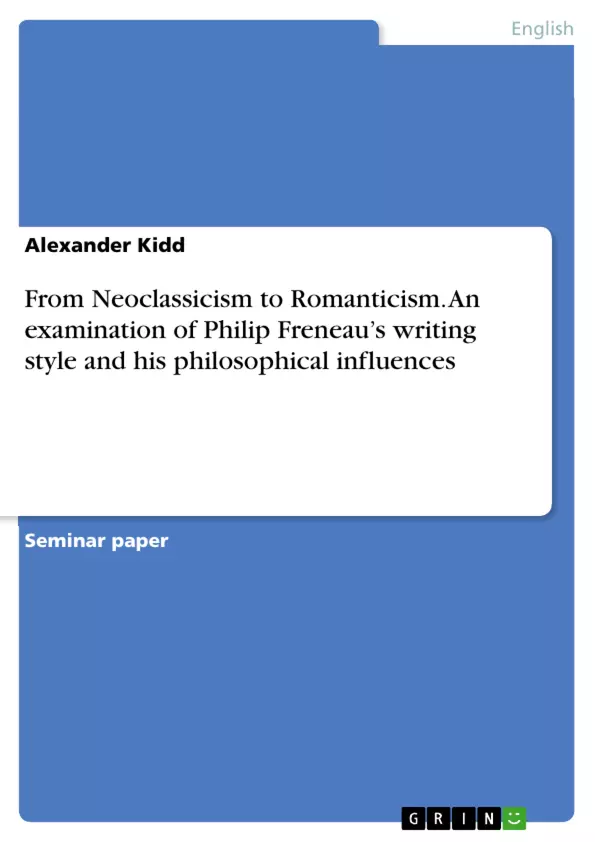Philip Freneau was an American poet whose works anticipated the American Romantic movement. This paper examines the influence of Enlightenment philosophy upon Philip Freneau's poetry, specifically in his poems "To Sir Toby" and "The Wild Honeysuckle."
The poetry of Philip Freneau provides a compelling snapshot into 18th century American thought. In poems such as "To Sir Toby," and "The Wild Honeysuckle," the influence of Enlightenment philosophers such as Thomas Hobbes and Jean-Jacques Rousseau is clearly recognizable, particularly through the manner in which the subject of nature is treated.
Freneau's poetry depicts a nation caught between Hobbes's cynical view of nature and Rousseau's strident romanticism of nature. Here, "To Sir Toby" and "The Wild Honeysuckle" are analyzed to reveal the turn of mind which led Freneau to anticipate many aspects of American Romanticism during the Post-Revolutionary Era.
Table of Contents
- Introduction
- Neoclassicism in "To Sir Toby"
- Didacticism and Verisimilitude
- Influence of Virgil
- Critique of Enlightenment Values
- Rousseau's Influence
- A Complicated View of Nature
- Influence of Hobbes
- Conclusion (Not included in preview)
Objectives and Key Themes
This paper examines Philip Freneau's poetic evolution, illustrating his transition from Neoclassicism to Romanticism. It analyzes how his work reflects the changing philosophical landscape of late 18th-century America, specifically focusing on his engagement with Enlightenment and Romantic ideals.
- Freneau's stylistic evolution from Neoclassicism to Romanticism.
- The influence of Enlightenment philosophies (e.g., Rousseau, Hobbes) on Freneau's poetry.
- Freneau's complex portrayal of nature and its relationship to humanity.
- The exploration of themes of slavery and social injustice in Freneau's work.
- Freneau's ambiguous stance on human nature and its inherent goodness or evil.
Chapter Summaries
Introduction: This introductory section sets the stage for the analysis of Philip Freneau's poetic development, highlighting the shift from Neoclassical to Romantic styles in his writing. It emphasizes the significance of understanding the prevalent philosophical perspectives of late 18th-century America to fully appreciate Freneau's transitional role in American literature. The introduction prepares the reader for a detailed examination of Freneau's poems "To Sir Toby" and "The Wild Honeysuckle," which serve as primary examples of his Neoclassical and Romantic styles, respectively.
Neoclassicism in "To Sir Toby": This chapter delves into Freneau's poem "To Sir Toby," showcasing its distinct Neoclassical characteristics. It examines the poem's didacticism and verisimilitude, common features of American Enlightenment writing. The influence of Virgil on Freneau's style is also discussed, along with the use of heroic couplets. The chapter further analyzes Freneau's critique of certain Enlightenment values, particularly the pursuit of wealth at the expense of human decency, as depicted through the character of Sir Toby. The chapter explores the complex interplay of Enlightenment and Romantic influences, analyzing Freneau's ambiguous view of nature and the conflicting perspectives of Rousseau and Hobbes on human nature. The use of vivid imagery and metrical variations to convey the grotesque realities of slavery is also highlighted, demonstrating Freneau's skill in evoking emotional responses in his readers.
Keywords
Philip Freneau, Neoclassicism, Romanticism, American Enlightenment, "To Sir Toby," "The Wild Honeysuckle," Jean-Jacques Rousseau, Thomas Hobbes, Virgil, slavery, nature, human nature, didacticism, verisimilitude.
Frequently Asked Questions: A Comprehensive Language Preview of Philip Freneau's Poetry
What is the purpose of this language preview?
This preview provides a comprehensive overview of a paper analyzing Philip Freneau's poetic evolution from Neoclassicism to Romanticism. It includes the table of contents, objectives, key themes, chapter summaries, and keywords.
What are the key themes explored in the paper?
The paper explores Freneau's stylistic transition, the influence of Enlightenment thinkers (Rousseau, Hobbes) on his poetry, his complex portrayal of nature, themes of slavery and social injustice, and his ambiguous stance on human nature.
What poems are analyzed in detail?
The preview focuses primarily on Freneau's poems "To Sir Toby" (as an example of Neoclassicism) and "The Wild Honeysuckle" (although details about "The Wild Honeysuckle" are not included in this preview).
What is the significance of "To Sir Toby" in the paper?
The chapter on "To Sir Toby" examines its Neoclassical characteristics, including didacticism and verisimilitude. It analyzes the influence of Virgil, Freneau's critique of Enlightenment values, the interplay of Enlightenment and Romantic influences, and the poem's depiction of slavery.
How does the paper analyze Freneau's relationship with Enlightenment thought?
The paper examines the influence of Enlightenment philosophies, particularly those of Rousseau and Hobbes, on Freneau's poetry and his complex portrayal of nature and human nature in light of these philosophies.
What is the scope of the paper's analysis of Neoclassicism?
The paper's analysis of Neoclassicism centers on its manifestation in "To Sir Toby," exploring elements like didacticism, verisimilitude, the influence of Virgil, and a critique of certain Enlightenment values. It also considers the use of heroic couplets and vivid imagery to portray the realities of slavery.
What are the keywords associated with this paper?
Key words include: Philip Freneau, Neoclassicism, Romanticism, American Enlightenment, "To Sir Toby," "The Wild Honeysuckle," Jean-Jacques Rousseau, Thomas Hobbes, Virgil, slavery, nature, human nature, didacticism, verisimilitude.
What is included in the Table of Contents?
The table of contents includes an introduction, a chapter on Neoclassicism in "To Sir Toby" (with sub-sections on didacticism, the influence of Virgil, Rousseau and Hobbes, and a critique of Enlightenment values), and a conclusion (although the conclusion is noted as not included in this preview).
- Citar trabajo
- Alexander Kidd (Autor), 2018, From Neoclassicism to Romanticism. An examination of Philip Freneau’s writing style and his philosophical influences, Múnich, GRIN Verlag, https://www.grin.com/document/459107



